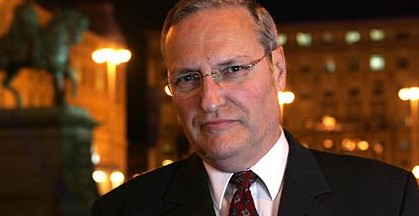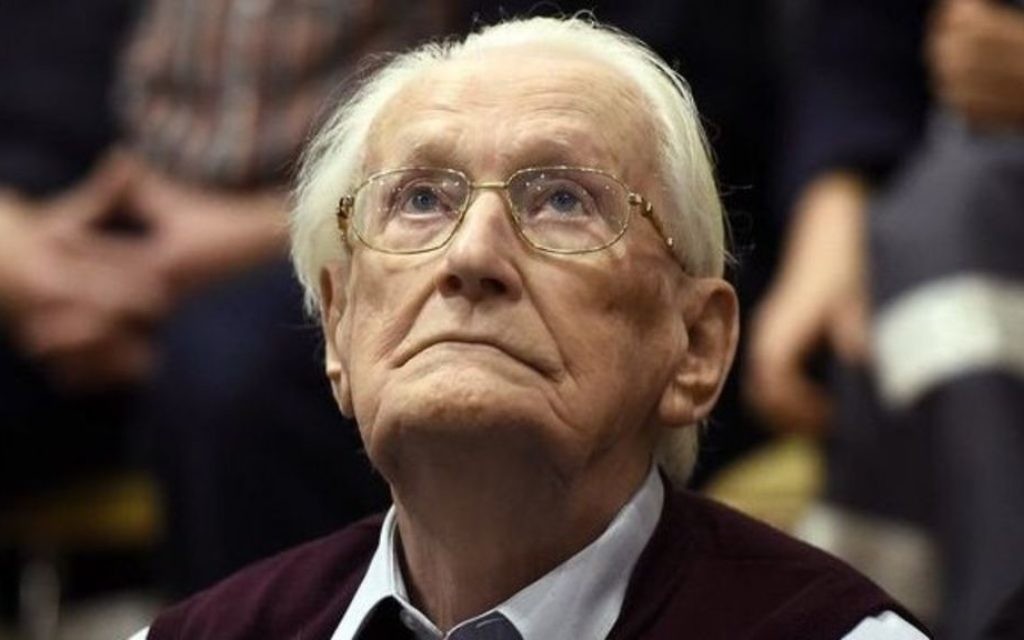OPINION – Efraim Zuroff: Shoah victims never had the clemency Oskar Groening wanted
Top Nazi-hunter at the Simon Wiesenthal Center reflects on the death of the 'bookkeeper of Auschwitz' this week
Normally, the death of a 96 year old Nazi in Germany would hardly warrant any media attention, but that was certainly not what happened this week in the case of Oskar Groening.
Over 1,000 media outlets all over the world reported his death, and for good reason, since his story was unusual in many respects, and his fate can serve as a symbol of Germany’s very belated efforts to bring Holocaust perpetrators to justice.
Until a decade ago, when Germany changed it prosecution policy vis-à-vis Nazi war criminals, it appeared that there was no likelihood that Groening would ever be prosecuted for his service as the bookkeeper of the Auschwitz-Birkenau death camp.
Get The Jewish News Daily Edition by email and never miss our top stories Free Sign Up
Up to that point, in order to put a Nazi on trial in Germany, prosecutors had to prove that the suspect had committed a specific crime against a specific victim and that the crime had been motivated by racial hatred.
That policy was dramatically changed about ten years ago, when the Americans obtained a deportation order against Sobibor death camp guard Ivan Demjanjuk for concealing his World War II service with the Nazis, but could not find a single country willing to prosecute him. They ultimately turned to the Germans, who came up with a solution that was absolutely brilliant, and changed the entire legal landscape of the efforts to bring Holocaust perpetrators to justice.

Thomas Walther and Kirsten Goetze, two prosecutors working on Nazi cases, suggested that since the sole purpose of the death camps was the murder of innocent civilians, anyone who served there in any capacity could be convicted not of murder, but of accessory to murder, for which the punishment was 5-15 years imprisonment. Demjanjuk was the precedent, having been convicted in 2011, and then the Germans began looking for anyone who served in a death camp or with the Einsatzgruppen (mobile killing units) for which the same reasoning applied, and that’s how Groening suddenly became a suspect.
There were, however, two highly unusual elements to Groening’s case. The first was that there was no indication that he had been physically involved in the murder process at Auschwitz. The second was that about fifteen years ago, Groening in response to a Holocaust denier, admitted his service in the camp and publically described some of the atrocities in interviews. At his trial, he also admitted his “moral guilt,” but failed to assume criminal responsibility for his role in the camp.
To date, three death camp operatives (Demjanjuk, Auschwitz guard Reinhold Hanning and Groening) have been convicted in Germany since 2011, and all appealed against their verdicts, but Groening was the only one who lived long enough to have his appeal officially rejected in a landmark decision which reinforced the validity of prosecuting any individual who served in any capacity in a death camp.
Groening was about to be sent to jail to finally start serving his 4 year sentence, when he died awaiting his final appeal for clemency to the governor of Lower Saxony. Shoah victims never had that option, and the SS at Auschwitz never had any mercy on them, murdering men, women and children, and even elderly people who were older that Groening was when he died in a hospital bed.
As important as these belated trials are in Germany, they lose some of their effect if none of those convicted are punished. It’s time the that the wheels of justice in these cases move much more quickly, keeping in mind that the Nazi wheels of murder were among the fastest ever.
- Dr. Efraim Zuroff, Director, Simon Wiesenthal Center – Israel office and Eastern European Affairs Coordinator

Thank you for helping to make Jewish News the leading source of news and opinion for the UK Jewish community. Today we're asking for your invaluable help to continue putting our community first in everything we do.
For as little as £5 a month you can help sustain the vital work we do in celebrating and standing up for Jewish life in Britain.
Jewish News holds our community together and keeps us connected. Like a synagogue, it’s where people turn to feel part of something bigger. It also proudly shows the rest of Britain the vibrancy and rich culture of modern Jewish life.
You can make a quick and easy one-off or monthly contribution of £5, £10, £20 or any other sum you’re comfortable with.
100% of your donation will help us continue celebrating our community, in all its dynamic diversity...
Engaging
Being a community platform means so much more than producing a newspaper and website. One of our proudest roles is media partnering with our invaluable charities to amplify the outstanding work they do to help us all.
Celebrating
There’s no shortage of oys in the world but Jewish News takes every opportunity to celebrate the joys too, through projects like Night of Heroes, 40 Under 40 and other compelling countdowns that make the community kvell with pride.
Pioneering
In the first collaboration between media outlets from different faiths, Jewish News worked with British Muslim TV and Church Times to produce a list of young activists leading the way on interfaith understanding.
Campaigning
Royal Mail issued a stamp honouring Holocaust hero Sir Nicholas Winton after a Jewish News campaign attracted more than 100,000 backers. Jewish Newsalso produces special editions of the paper highlighting pressing issues including mental health and Holocaust remembrance.
Easy access
In an age when news is readily accessible, Jewish News provides high-quality content free online and offline, removing any financial barriers to connecting people.
Voice of our community to wider society
The Jewish News team regularly appears on TV, radio and on the pages of the national press to comment on stories about the Jewish community. Easy access to the paper on the streets of London also means Jewish News provides an invaluable window into the community for the country at large.
We hope you agree all this is worth preserving.
-
By Brigit Grant
-
By Laurent Vaughan - Senior Associate (Bishop & Sewell Solicitors)
-
By Laurent Vaughan - Senior Associate (Bishop & Sewell Solicitors)
-
By Laurent Vaughan - Senior Associate (Bishop & Sewell Solicitors)
-
By Laurent Vaughan - Senior Associate (Bishop & Sewell Solicitors)






















